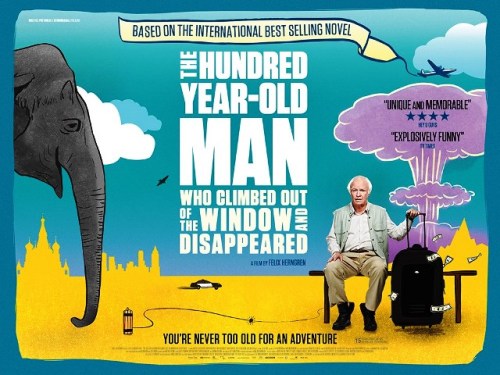Our book club meets every two months. There are about 12 of us and our literary tastes vary greatly, but we all enjoy the variety of books we get to read and the stimulating (and at times quite challenging!) conversations we have about them. It was my turn to pick this month and I chose ‘The Hundred Year Old Man who climbed out of the Window and Disappeared’ by Jonas Jonasson‘ *
I had given up on the book when it first came out but because so many recommended it, I persevered and enjoyed its idiosyncratic romp through 20th century history and the somewhat amoral adventures of its central Swedish character Allan Karlsson.
We have to come up with questions about the book, and as it’s a very erudite group, that’s not always easy. Of course the internet helps but I couldn’t find many questions that dealt with the myriad events in the story, so came up with some of my own.
* The page references refer to the Hesperus Press 2012 paperback edition of the ‘One Hundred Year Old Man’.
1. Allan climbs out a window to escape his 100th birthday party at the Retirement Home he is living which he obviously doesn’t want to attend. Why? What does it tell us about him?
1. The friendship between Allan and Julius Jonsson starts in a very unusual way. What did you think of the way they dealt with Bolt and his suitcase? What does friendship mean in this story?
2. The story very quickly flips back in time to Allan’s childhood. His mother says. “Things are what they are, and whatever will be, will be.” (Ch4, P37) In what ways do you think his parents influenced how he grew up?
3. Allan gets sterilized by Professor Lundborg. This passage (end of chapter 4) can be read seriously, ironically or simply humorously. How do you read it and what do you think of the humour in the novel?
4. Chief Inspector Aronsson plays a key role in the story. Why is he so focused on finding Allan and what does that add to the story?
5. In Chapter 7 Allan works for Estéban who is an ardent socialist. Allan doesn’t want to get involved in politics. “It wasn’t that Allan took an opposite view of the ways of the world and argued accordingly. No, he simply had no opinion whatsoever.” During the Spanish Civil War he becomes ‘firm friends’ with General Franco. This sets a pattern for the rest of the story. What do you think of his world view and the ‘co-incidences’ of his meetings with other famous people?
6. Benny and ‘The Beauty’ join Allan’s ‘gang’ early on in the story. Sonya becomes a man-slaughtering elephant (Chapter 10 & 12). Why does Allan give the command, “Sit, Sonya, sit.” Does he show similar characteristics in other places in the story?
7. “Excuse me, but why don’t you divide the uranium into two parts?” (Chapter 9 P107) Thus Allan apparently solved the nuclear fusion issue. What implications does this have and what unexpected results does it have for Allan? What about the morality of his actions?
8. Allan ends up in an Iranian prison cell with priest Kevin Ferguson, who tries to convert Allan but gives up, ‘even though God must have had some purpose in placing us in the same cell.’ (Chapter 12 p159) Eventually they thwart a plot to kill Churchill and Allan gets back to Sweden. Half way through the book, what opinion do you think we are meant to have about Allan and life?
9. ‘As a child, Allan had been taught to be suspicious of people who didn’t have a drink when the opportunity arose.’ “Beware of drunks, Allan.” (P135) “Benny said that teetotallers, in general according to Allan – were a threat to world peace, but that they were useful to have a hand when you needed a lift somewhere.” P317. What role does alcohol play in the book?
10. Chapter 18 deals with Stalin, the events of the Vladivostok fire and Allan’s escape to North Korea. As with many other chapters this one weaves history with fiction. Is it a successful way of writing and what do you learn from it, if anything.
11. Allan’s gang and Per-Gunnar spend a relatively trouble-free time at Bosse’ house until Chief Inspector Aronsson turns up. How does he shift the dynamic and what does he bring to the story?
12. In the complicated ‘explanation’ the gang gives to Prosecutor Ranelid, Benny says, “Innocence can mean different things depending on whose perspective you adopt.” (Ch25 P34) How is that relevant to this story?
13. What do you think of the final chapters of the book and its ending?
14. Does the dual timeline add or detract from the novel?
15. The author describes his novel as “a hopeful satire on the shortcomings of mankind” A definition of “satire” is “a literary composition in which vices, abuses and follies, etc are held up to scorn, derision or ridicule” (Macquarie Dictionary). Do you think this novel is a satire —and if so is it successful?
When I sent these questions out to our group, I was told that there are some excellent ones at the back of the book. (Must admit I had read it on my Kindle and not see them!) And there’s also an interview with the author. A film of the book came out recently – I haven’t had time to watch it yet, but it got mixed reviews. It’s also out on Audio Book so plenty of ways to get to grips with this very quirky book set in Sweden but roaming the world …



